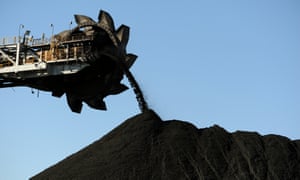Shane Rattenbury says push to subsidise new coal is against both climate science and common sense
The ACT has declared any coal deal to placate conservative Liberals
and Nationals would be “entirely unhelpful” to a successful resolution
of the national energy guarantee in early August.
With pro-coal forces within the government on the march, the territory’s climate change minister, Shane Rattenbury, has warned the commonwealth a side deal on coal could kill the Neg.
Rattenbury told the ABC on Monday it was too soon to be definitive on what position the ACT would take to a meeting of energy ministers in August, but said the new coal push worked against climate science “and it also goes against common sense because we know wind and solar are the two cheapest forms of new energy into the market”.
Rattenbury said if the federal energy minister, Josh Frydenberg, struck a side deal with internal critics to hold party room support for the policy, it would make a state and federal agreement on the Neg “a much harder deal to support”.
He said the ACT was waiting on the release of a final design paper from the Energy Security Board in late July before resolving its stance, but said: “The push to subsidise new coal into the system in a very artificial way is entirely unhelpful and I think contrary to where Australia’s energy system should be going.”
Any single state or territory has the power to veto the Neg when they meet on 10 August.
The territory minister said that so far Frydenberg had given his internal Coalition critics a low emissions reduction target, and had attempted to lock it in for 10 years, stepping back from an early proposal to have reviews of the electricity target every five years.
Over the weekend, the Nationals leader and deputy prime minister, Michael McCormack, told the LNP to get behind the Neg but also left the door open for a coal-inclusive future.
While some Nationals want to lock in coal during the transition, the Greens are pushing for a parliamentary inquiry into profiteering by the power companies and the failure of deregulation and privatisation of the retail electricity sector.
Wholesale prices have come down recently because of new renewable capacity coming on stream in the national electricity market, but government MPs remain under acute political pressure because of high power prices.
A recent report by the Grattan Institute said wholesale electricity prices rose across the national electricity market by 130% on average between 2015 and 2017, with household bills in some states increasing by up to 20% in 2017 alone.
A separate report from the Australian Energy Market Commission sounded the alarm over comparator websites offering consumers advice about their electricity plans, saying the sites lacked transparency, and possibly inflated power prices.
The government has recently been handed a report by the Australian Competition and Consumer Commission examining the supply of retail electricity and the competitiveness of retail electricity prices.
With pro-coal forces within the government on the march, the territory’s climate change minister, Shane Rattenbury, has warned the commonwealth a side deal on coal could kill the Neg.
Rattenbury told the ABC on Monday it was too soon to be definitive on what position the ACT would take to a meeting of energy ministers in August, but said the new coal push worked against climate science “and it also goes against common sense because we know wind and solar are the two cheapest forms of new energy into the market”.
Rattenbury said if the federal energy minister, Josh Frydenberg, struck a side deal with internal critics to hold party room support for the policy, it would make a state and federal agreement on the Neg “a much harder deal to support”.
He said the ACT was waiting on the release of a final design paper from the Energy Security Board in late July before resolving its stance, but said: “The push to subsidise new coal into the system in a very artificial way is entirely unhelpful and I think contrary to where Australia’s energy system should be going.”
Any single state or territory has the power to veto the Neg when they meet on 10 August.
The territory minister said that so far Frydenberg had given his internal Coalition critics a low emissions reduction target, and had attempted to lock it in for 10 years, stepping back from an early proposal to have reviews of the electricity target every five years.
Over the weekend, the Nationals leader and deputy prime minister, Michael McCormack, told the LNP to get behind the Neg but also left the door open for a coal-inclusive future.
While some Nationals want to lock in coal during the transition, the Greens are pushing for a parliamentary inquiry into profiteering by the power companies and the failure of deregulation and privatisation of the retail electricity sector.
Wholesale prices have come down recently because of new renewable capacity coming on stream in the national electricity market, but government MPs remain under acute political pressure because of high power prices.
A recent report by the Grattan Institute said wholesale electricity prices rose across the national electricity market by 130% on average between 2015 and 2017, with household bills in some states increasing by up to 20% in 2017 alone.
A separate report from the Australian Energy Market Commission sounded the alarm over comparator websites offering consumers advice about their electricity plans, saying the sites lacked transparency, and possibly inflated power prices.
The government has recently been handed a report by the Australian Competition and Consumer Commission examining the supply of retail electricity and the competitiveness of retail electricity prices.

No comments:
Post a Comment